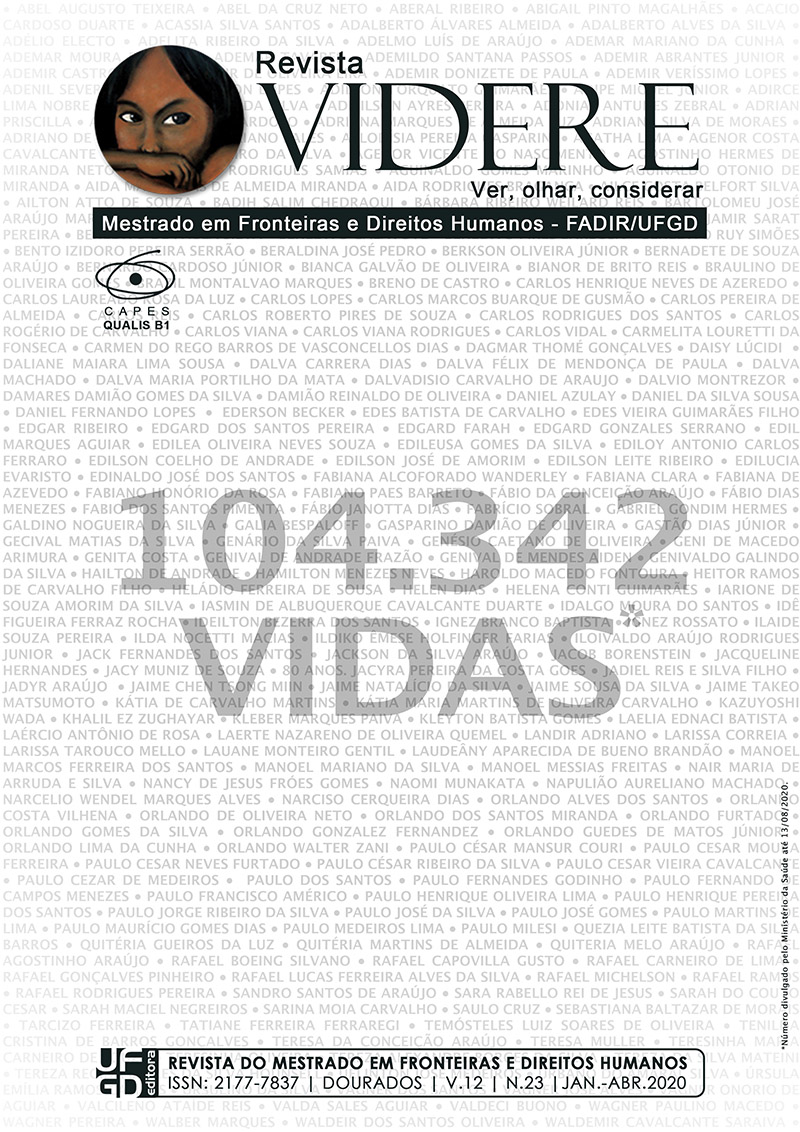The need for reform of the brazilian federative pact: an analysis of PEC 188/2019 that extinguishes municipalities
DOI:
https://doi.org/10.30612/videre.v12i23.11235Keywords:
Federalism. Cooperative. Municipalities. PEC 188/2019.Abstract
The debate on the conceptualization and meaning of federalism goes back to the late eighteenth century. The peculiar circumstances surrounding the move from confederation to federation in the United States in the years 1781 to 1789 shaped the nature of the intellectual debate, so that one of the greatest historical innovations for government and politics was achieved. This form of state has two modes of manifestation: the competitive - typical American; and cooperative - typical German. In Brazil, the model adopted in the 1988 Constitution was the cooperative, but due to the centralization of financial collection by the Union and the decentralization of competences to local governments, the federal structure became predatory. In order to curb this model, the federal government sent PEC 188/2019 to the National Congress. Through the use of the deductive and hermeneutic method, we seek to answer the research problem: PEC 188/2019 that, among other proposals, extinguishes small municipalities, causes a reformulation of Brazilian federalism, making it more cooperative or entails stagnation, exacerbating even more so, evidencing a predatory federalism? The structure starts from the analysis of the shape of the federa state, to later observe the manifestation of the cooperative model and at the end to verify PEC 188/2019 for the extinction of small municipalities.
Downloads
References
AFFONSO, Rui Britto Alvares. O federalismo e as teorias hegemônicas da economia do setor público na segunda metade do século XX: um balanço crítico. Campinas: UNICAMP, 2003.
BENZ, Arthur. Föderalismus und Demokratie. Eine Untersuchung zum Zusammenwirken zweier Verfassungsprinzipien. – Hagen: Institut für Politikwissenschaft, 2003.
BENZ, Arthur. Der moderne Staat. Grundlagen der politologischen Analyse. München (Oldenbourg), 2008.
BENZ, Arthur. Ein gordischer Knoten der Politikwissenschaft? - Zur Vereinbarkeit von Föderalismus und Demokratie. Frankfurt: Politische Vierteljahresschrift, 2009.
BEYME, Klaus von. Das politische System der Bundesrepublik Deutschland nach der Vereinigung. München: Verlag R. Piper, 1993.
BOBBIO, Norberto. Estado, governo, sociedade. São Paulo: Paz e Terra, 1987.
BONAVIDES, Paulo. Ciência política. 10. ed. São Paulo: Malheiros, 2003.
COCK. Vanessa Suelt. A influencia del federalismo dual en el nuevo régimen local español. Bogotá. Estud. Socio-Juríd. v.12, jan. 2010.
CONFEDERAÇÃO NACIONAL DE MUNICÍPIOS. Parecer jurídico sobre a Proposta de extinção de Municípios - Análise das consequências da nova distribuição do FPM, 2019. Disponível em: https://www.cnm.org.br/cms/biblioteca/Caderno_CNM-Extincao_de_Municipios.pdf. Acesso em: 15 mar. 2020.
ELAZAR, Daniel. Exploring Federalism. Tuscaloosa: University of Alabamba, 1987.
KING, Preston. Federalism and Federation. London: Croom Helm, 1982.
KRELL, Andreas. Leis de normas gerais, regulamentação do Poder Executivo e cooperação intergovernamental em tempos de Reforma Federativa. Belo Horizonte: Fórum, 2008.
KROPP, Sabine. Kooperativer Föderalismus und Politikverflechtung. Wiesbaden: Verlang, 2010.
MUELLER, Sean. Self-Rule and Shared Rule. 2017. Disponível em: http://50shadesoffederalism.com/theory/self-rule-shared-rule/. Acesso em: 12 nov. 2019.
REVERBEL, Carlos Eduardo Dieder. O federalismo numa visão tridimensional do direito. Porto Alegre: Livraria do Advogado, 2012.
SCHAKEL, A. H.; LIESBET, H.; MARKS. G. Multilevel governance and the state.’ In The Oxford Handbook of Transformations of the State. Oxford: Oxford University Press, p.266-282. 2015.
SCHICK, Gerhard. Bundesstaatsreform I. Für eine bürgernahe, effiziente und transparente Politik. Berlin: Stiftung Marktwirtschaft, 2004.
SCHMIDT, Manfred G. Thesen zur Reform des Föderalismus der Bundesrepublik Deutschland. Politische Vierteljahresschrift, Deutschland., n. 3, p. 474–491, dez. 2001.
Downloads
Published
How to Cite
Issue
Section
License
Authors must accept the publication rules when submitting the journal, as well as agree to the following terms:
(a) The Editorial Board reserves the right to make changes to the Portuguese language in the originals to maintain the cultured standard of the language, while respecting the style of the authors.
(b) Authors retain the copyright and grant the journal the right to first publication, with the work simultaneously licensed under the Attribution-NonCommercial-ShareAlike 3.0 Brazil (CC BY-NC-SA 3.0 BR) that allows: Share - copy and redistribute the material in any medium or format and Adapt - remix, transform, and create from the material. CC BY-NC-SA 3.0 BR considers the following terms:
- Attribution - You must give the appropriate credit, provide a link to the license and indicate whether changes have been made. You must do so under any reasonable circumstances, but in no way that would suggest that the licensor supports you or your use.
- NonCommercial - You may not use the material for commercial purposes.
- Sharing - If you remix, transform, or create from material, you must distribute your contributions under the same license as the original.
- No additional restrictions - You may not apply legal terms or technological measures that legally restrict others from doing anything that the license permits.
(c) After publication, authors are allowed and encouraged to publish and distribute their work online - in institutional repositories, personal page, social network or other scientific dissemination sites, as long as the publication is not for commercial purposes.



















